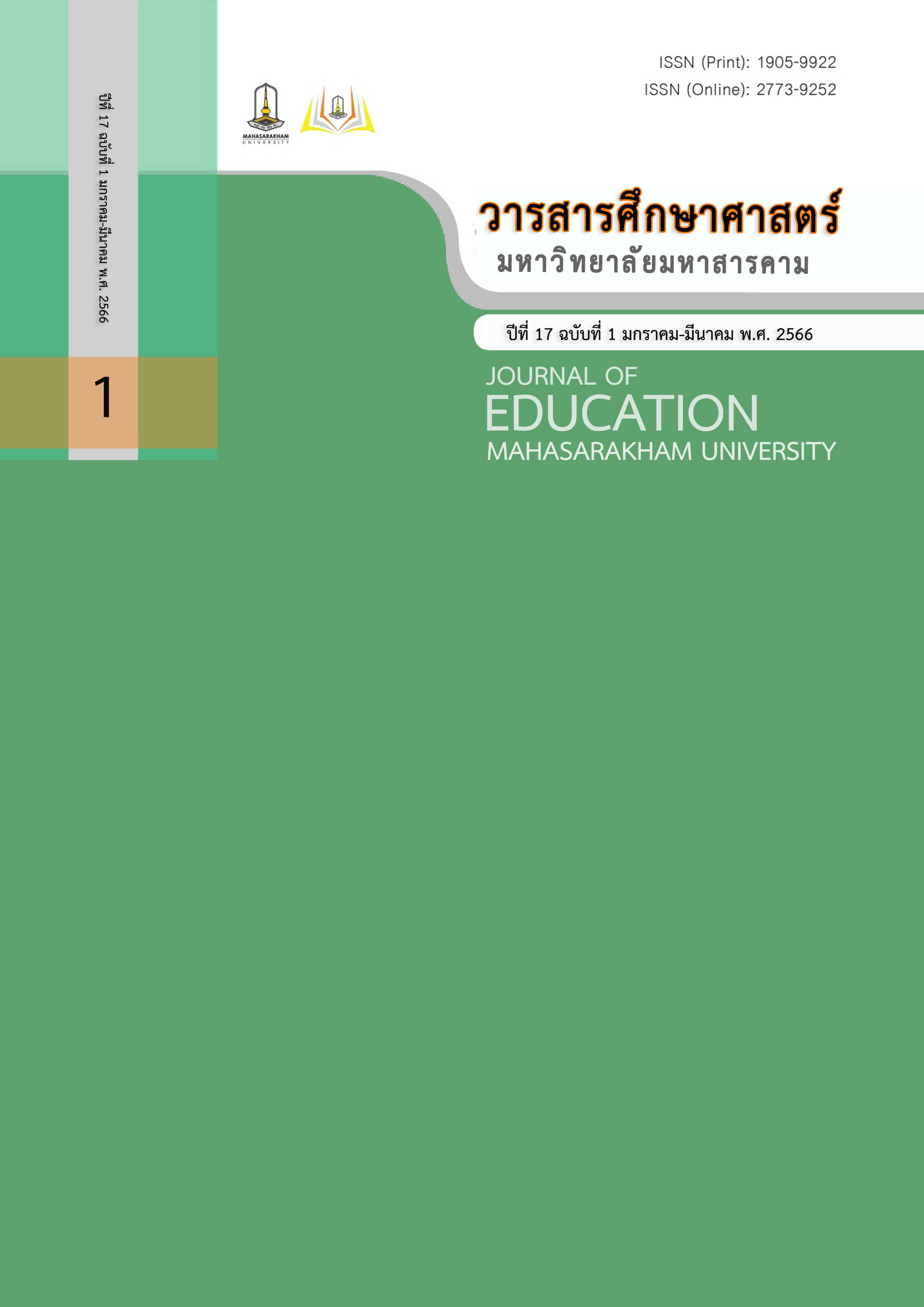การพัฒนาเจตคติทางวิทยาศาสตร์และแรงจูงใจใฝ่สัมฤทธิ์ของนักเรียนชั้นประถมศึกษาปีที่ 6 ด้วยการจัดการเรียนรู้ตามแนวคิดการสืบเสาะหาความรู้และการใช้เหตุผล
Main Article Content
บทคัดย่อ
การวิจัยครั้งนี้มีวัตถุประสงค์เพื่อ 1) พัฒนาเจตคติทางวิทยาศาสตร์และแรงจูงใจใฝ่สัมฤทธิ์ของนักเรียนที่จัดการเรียนรู้ตามแนวคิดการสืบเสาะหาความรู้และการใช้เหตุผล หลังเรียนทำให้สูงขึ้นกว่าก่อนเรียน 2) เปรียบเทียบเจตคติทางวิทยาศาสตร์และแรงจูงใจใฝ่สัมฤทธิ์ ระหว่างกลุ่มทดลองที่จัดการเรียนรู้ตามแนวคิดการสืบเสาะหาความรู้และการใช้เหตุผล กับกลุ่มควบคุมที่จัดการเรียนรู้แบบปกติ การวิจัยครั้งนี้เป็น การวิจัยกึ่งทดลอง (Quasi-Experimental research) ด้วยการสุ่มเพื่อกำหนดกลุ่มทดลองและกลุ่มควบคุม (Random assignment) กับนักเรียนชั้นประถมศึกษาปีที่ 6 โรงเรียนชุมชนเทศบาล 3 (พินิจพิทยานุสรณ์) อำเภอเมืองนครพนม จังหวัดนครพนม ห้อง 1/1 และห้อง 1/2 จำนวน 33 คน และจำนวน 30 คน ตามลำดับ ในภาคเรียนที่ 2 ปีการศึกษา 2565 ที่ได้มาจากการสุ่มแบบกลุ่ม (Cluster random sampling) เครื่องมือที่ใช้จัดเก็บข้อมูล ได้แก่ 1) แผนการจัดการเรียนรู้ จำนวน 16 แผน มีคุณภาพและความเหมาะสมโดยรวม อยู่ในระดับมาก มีค่าเฉลี่ยเท่ากับ 4.37 (S.D.= 0.49) 2) แบบประเมินเจตคติทางวิทยาศาสตร์ จำนวน 24 ข้อ มีค่าอำนาจจำแนกอยู่ระหว่าง 0.42–0.53 ค่าความเชื่อมั่นทั้งฉบับ ( ) เท่ากับ 0.87 และ 3) แบบประเมินแรงจูงใจใฝ่สัมฤทธิ์ จำนวน 20 ข้อ มีค่าอำนาจจำแนกอยู่ระหว่าง 0.38–0.56 ค่าความเชื่อมั่นเท่ากับ 0.86 สถิติที่ใช้ในการวิเคราะห์ข้อมูล ได้แก่ ค่าเฉลี่ย ส่วนเบี่ยงเบนมาตรฐาน การทดสอบด้วย t-test (Dependent sample) สถิติ One-way MANOVA และ Univariate Test ผลการวิจัยพบว่า 1) นักเรียนกลุ่มทดลองมีเจตคติทางวิทยาศาสตร์และแรงจูงใจใฝ่สัมฤทธิ์ หลังเรียนสูงกว่าก่อนเรียน อย่างมีนัยสำคัญทางสถิติที่ระดับ .05 ซึ่งมีคะแนนเฉลี่ยก่อนเรียนเท่ากับ 39.85 และ 35.12 และหลังเรียนเท่ากับ 55.70 และ 49.76 ตามลำดับ และ 2) นักเรียนกลุ่มทดลองมีเจตคติทางวิทยาศาสตร์และแรงจูงใจใฝ่สัมฤทธิ์หลังเรียนสูงกว่า กลุ่มควบคุม อย่างมีนัยสำคัญที่ระดับ .05 ซึ่งมีคะแนนเฉลี่ยเจตคติทางวิทยาศาสตร์เท่ากับ 55.70 และ 53.30 และคะแนนเฉลี่ยแรงจูงใจใฝ่สัมฤทธิ์เท่ากับ 49.76 และ 47.67 ตามลำดับ
Downloads
Article Details

อนุญาตภายใต้เงื่อนไข Creative Commons Attribution-NonCommercial-NoDerivatives 4.0 International License.
เอกสารอ้างอิง
กระทรวงศึกษาธิการ. (2545). หลักสูตรแกนกลางการศึกษาขั้นพื้นฐาน พุทธศักราช 2544 คู่มือการจัดการเรียนรู้กลุ่มสาระการเรียนรู้วิทยาศาสตร์. กรุงเทพฯ : กระทรวงศึกษาธิการ.
กระทรวงศึกษาธิการ. (2551). ตัวชี้วัดและหลักสูตรแกนกลาง กลุ่มสาระการเรียนรู้วิทยาศาสตร์ (ฉบับปรับปรุง พ.ศ. 2560) ตามหลักสูตรแกนกลางการศึกษาขั้นพื้นฐาน พุทธศักราช 2551. กรุงเทพฯ: โรงพิมพ์ชุมนุมสหกรณ์การเกษตรแห่งประเทศไทย จํากัด.
กริ่งแก้ว นวลศรี. (2551). การส่งเสริมทักษะการทดลองและเจตคติต่อวิทยาศาสตร์ด้วยกิจกรรมการทดลองในชุมนุมวิทยาศาสตร์. การค้นคว้าอิสระปริญญาวิทยาศาตรมหาบัณฑิต. มหาวิทยาลัยอุบลราชธานี
วรันญา วิรัสสะ (2562). การศึกษาหาความสัมพันธ์ของเจตคติต่อวิทยาศาสตร์กับทักษะกระบวนการทางวิทยาศาสตร์ ของนักเรียนชั้นมัธยมศึกษาปีที่ 1 ในจังหวัด
สิงห์บุรี สังกัดโรงเรียนเขตพื้นที่การศึกษามัธยมศึกษาเขต 5. วารสารวิชาการมหาวิทยาลัยปทุมธานี. ปีที่ 11 ฉบับที่ 2 (กรกฎาคม-ธันวาคม 2562).
สถาบันส่งเสริมการสอนวิทยาศาสตร์และเทคโนโลยี. (2546). การจัดสาระการเรียนรู้กลุ่มวิทยาศาสตร์หลักสูตรการศึกษาขั้นพื้นฐานพุทธศักราช 2544. กรุงเทพฯ: โรงพิมพ์คุรุสภาลาดพร้าว.
สุทธิกร กรมทอง. (2559). การจัดกิจกรรมการเรียนรู้เพื่อเสริมสร้างแรงจูงใจใฝ่สัมฤทธิ์ทางการเรียนของนักเรียน โดยใช้รูปแบบห้องเรียนกลับด้านร่วมกับเทคนิคเกมิฟิเคชัน สำหรับนักเรียนห้องเรียนพิเศษวิทยาศาสตร์ ชั้นมัธยมศึกษาปีที่ 2 โรงเรียนวาปีปทุม. วิทยานิพนธ์ครุศาสตรมหาบัณฑิต. มหาสารคาม: มหาวิทยาลัยราชภัฏมหาสารคาม.
สำนักงานคณะกรรมการการศึกษาแห่งชาติ. (2545). พระราชบัญญัติการศึกษาแห่งชาติพ.ศ. 2542 แก้ไขเพิ่มเติม (ฉบับที่ 2).กรุงเทพฯ: สำนักงานคณะกรรมการการศึกษาแห่งชาติ.
สำนักวิชาการและมาตรฐานการศึกษา. (2551). หลักสูตรแกนกลางการศึกษาขั้นพื้นฐาน พุทธศักราช 2551. กรุงเทพฯ: คุรุสภาลาดพร้าว.
Denby, Neil. (2012). “Learning to Teach : An Introduction.” In Training To Teach: Guide to Students. 2nd Ep. London : SAGE Publications Ltd., pp.1-12.
Gauld, C.F. (1982). “The Scientific Attitude and Science Education : A Critical Re-Appraisal,” Science Education. 66(1): 109-121; January.
Hasan, O.E. and V.Y. Billen. (1975). “Relationships Between Teachers Change in AttitudesTowards Sciences and Some Professional Variables,” Journal of Research inScience Teaching. 12(3): 247-253; July.
McClelland, D.C. (1953). The Achievement Motive. New York: Appleton Century Croffs, Inc., 1953.
Santrock, John W. (2008). Educational Psychology. 3rd ed. New York: McGraw-Hill Companies Inc.
Surayanah and L Karma (2018). The contribution of school climate, achievement motivation, and self-concept to science learning achievement. International Conference on Mathematics and Natural Sciences (IConMNS 2017). IOP Conf. Series: Journal of Physics:
Conf. Series 1040 (2018) 012041. doi: 10.1088/1742-6596/1040/1/012041.
Woolfolk, Anita. (2010). Educational Psychology. 11th ed. Upper Saddle River NJ: Pearson Education, Inc.


